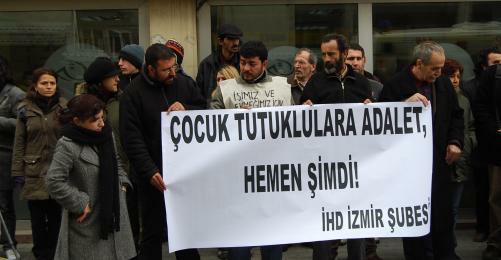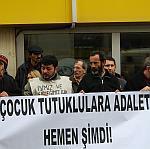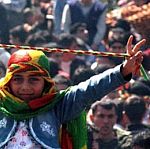Emma Sinclair Webb, rapporteur for Human Rights Watch (HRW) in Turkey, has said that unclear definitions of what terrorism entails have led to severe sentences for children and young people.
Speaking at the Sixth Gathering in Istanbul, organised by the Initiative against Crimes of Thought, Sinclair Web recounted that, during the last year, children and teenagers in Diyarbakır, Adana and Mersin have been tried as if they were members of an armed militant group.
She emphasised that this was possible because of certain laws. Article 220 of the Turkish Penal Code says that those who are not members of an illegal organisation but commit crimes in the name of such an organisation will be tried as members. Article 314 allows up to 10 years imprisonment for membership in an armed illegal organisation.
She said that keeping children in prison for a long time was an urgent problem.
Severe sentences for slogans and victory signs
As an example, Webb cited the case of Dicle University student Murat Işıkırık. Because he is alleged to have made the victory sign and to have applauded a group carrying out two protests in favour of the PKK in 2006, he has been sentenced to six years and three months imprisonment.
In March 2009, his sentence was approved. He is likely to receive another 10 month sentence for "spreading propaganda of an illegal organisation".
In another case, Mehmet Emin Turan was sentenced to seven years imprisonment for joining a protest and shouting slogans in Nusaybin, in the southeastern province of Mardin.
Webb called for the definition of terrorist crimes to be limited to death, severe violence or kidnapping and a clear delimination of what represented a terrorist act.
International attendance
The sixth Gathering in Istanbul was held from 22 to 24 May. As well as Sinclair Webb, representatives from Amnesty International (AI), the International PEN Writers' Union and the International Publishers Association (IPA) presented papers at the gathering.
Andrew Gardner from AI spoke about the compensation claims that writer Orhan Pamuk faces, implementations of the controversial Article 301, as well as the oppression LGBTT groups and headscarved individuals faced.
Alexis Krikorian from IPA spoke about the obstructions Iranian publishers face before and after publishing books.
Eugene Schoulgin, general secretary of PEN, said that he had been living in Turkey for a long time: "We are here, but we do not face this pain and exclusion." (EÖ/AG)













